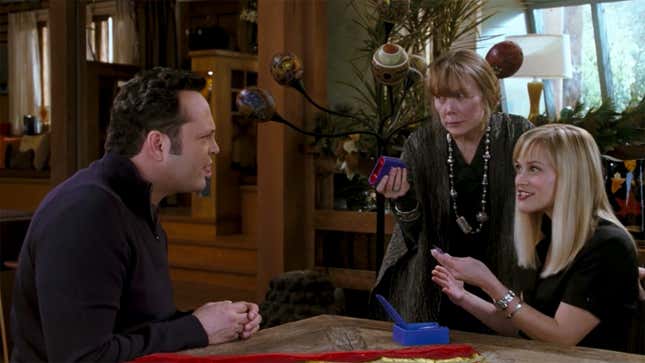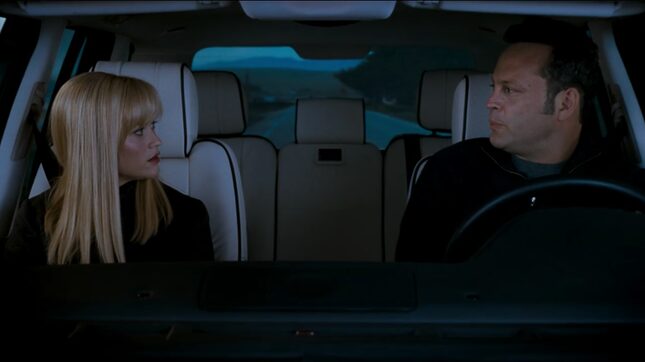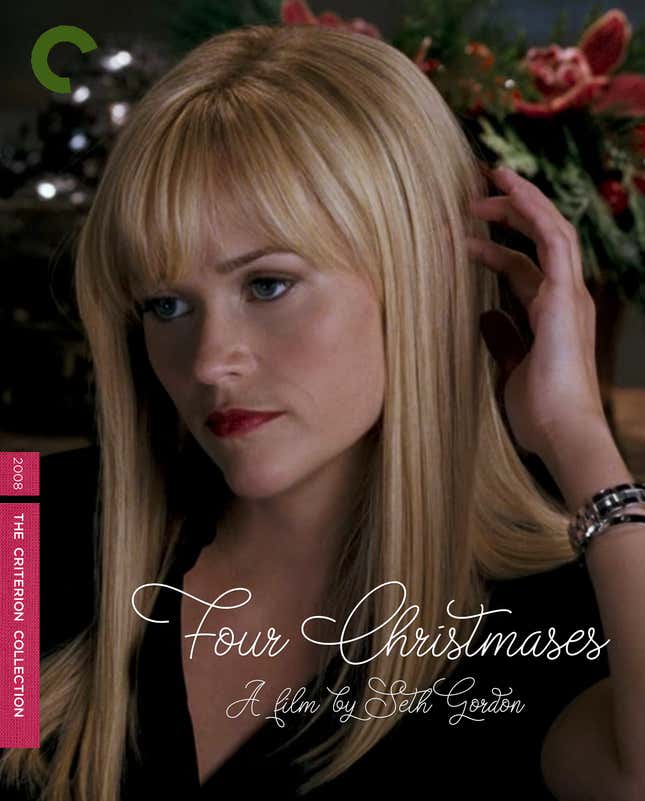

Some movies—particularly those universally agreed upon as “bad” movies—need to do only one thing well (or distinctly) to warrant repeat viewing. The shark roars at the end of Jaws: The Revenge, rendering it perfectly stupid. The nipples and codpieces of Batman & Robin will never not be a spectacle-sized distraction, their own specific reason to check back in. The psychedelic tantrum Pia Zadora unleashes at a critical juncture in the notorious 1983 bomb The Lonely Lady was enough to warrant a Blu-ray purchase for at least one person on earth (me).
These worth-the-price-of-admission gems can elevate trash exponentially. So many movies come and go with nary a single moment worth remembering, much less one that burns itself in the memory of crap connoisseurs. There is one such scene in 2008’s widely panned Four Christmases. It involves a fraught round of the guessing game Taboo with a trigger happy Sissy Spacek on buzzer. To me, it is perfect.
More than in other subgenres, the Christmas movie thrives on relatability. Sometimes the movie is itself the object to which you relate, as in the case of a film that you watch every year at Christmastime, unable to untangle how much general affection for the movie drives you to watch it versus tradition and all the feelings of warmth that familiarity conjures. Four Christmases, though, covers a few things that Christmas movies typically ignore. The party game Taboo is one of them for me (I’ve played this very game and countless others with my family on Christmas). Simply no other movie has gotten Taboo the way Four Christmases has gotten Taboo and nothing will ever diminish that cinematic achievement.
This is a film about the grotesqueness of humanity that emerges in the kind of close quarters that holiday celebrations typically call for.
Something I also enjoy, but don’t quite relate to, is the sustained sigh at the very prospect of having to spend time with family that Four Christmases emits for the majority of its 88-minute runtime. In the Seth Gordon-directed movie, Vince Vaughn and Reese Witherspoon play a self-absorbed couple who have once again deceived their families into thinking that they’re too busy doing good to come home for the holiday (“You really can’t spell families without lies,” explains Vaughn’s Brad). Their flight to their vacation in Fiji is grounded and a live news broadcast from the airport captures them at the ticket counter, exposing them to their families, who promptly call and implore them to visit. As they are both children of divorce, Brad and Kate set off for four visits to their parents and attendant relatives. Broad-comedy hijinks (a botched satellite-TV setup that ends with an exploding television set, a projectile-vomiting infant) and stereotypes (Brad’s father’s side are Bay Area rednecks, while his mother is a hippie) ensue.
I don’t share the movie’s cynicism, but I admire it. This is a film about the grotesqueness of humanity that emerges in the kind of close quarters that holiday celebrations typically call for. Kate comes up against a plague of mocking, evil children in a bounce house at her mother’s place, which is populated by women who are more interested in flirting with her supposedly dashing partner than they are in their own flesh and blood. Brad’s mom (played by Spacek) observes that he hasn’t missed meals upon greeting him, in an apparent reference to the weight Vaughn himself gained over the course of his tenure as leading man. Brad is confronted with the image of his childhood best friend having sex with his mother, as they’re now a couple. Very little eating or caroling takes place—Christmas is very much the backdrop of an absurd story about embarrassing families and their continued obligation to stay related. Four Christmases is so not Christmassy that it’s perversely realistic. Its glue is that which slips through the cracks of other yuletide fare.

Its irreverence is never more apparent than a scene depicting a Christmas pageant that Brad and Kate are pressured to appear in at the megachurch to which Kate’s mother (played by Mary Steenburgen in a role that is not at all unlike the one she has in this year’s Happiest Season) belongs. They are, naturally, Joseph and Mary, and while Brad takes the role deathly seriously (memorizing both parts, apparently on sight), Kate freezes up. It leads Brad’s Joseph to, in front of the entire congregation, deem Mary an “unfit mother,” which I thought was also very bold in even the humbuggiest of Christmas movies. This is another one of those indelible, price-of-admission moments.
Four Christmases is so not Christmassy that it’s perversely realistic.
The funny thing about that scene is that, if you believe the rumors, it was a mirror image of what was actually going on behind the scenes. It was reported during filming that Vaughn and Witherspoon hated working together. In 2007, the New York Daily News ran an item claiming, “Famously alpha personality Reese — who named her production company Type A Films — is clashing with Vaughn’s laid-back approach to work.” It went on:
“Vince rolls onto set in the morning looking like he just came in from a night out, while Reese will arrive early looking camera-ready,” says our San Francisco source. “Then Reese tries to force Vince into blocking out each scene and running through their lines as Vince tries to convince her that he’s an ad-libber and wants to play around and see where the scene goes.”
They were also rumored to have nixed a planned sex scene out of disdain (Decider has a great roundup of the on-set rumors as well as the detectable tension during the film’s release). However, there is a sex scene in the movie’s opening, in which Brad meets Kate at what appears to be a corporate Christmas party at a nightclub and she rebuffs him, only to cave when he proves irresistibly domineering. They quickly find their way to a bathroom to relieve their sexual tension. It turns out that this is nothing more than role-play for long-term partners, and this thrust-into fantasy device at the opening of a film is one of my favorite tropes (also see The Duke of Burgundy, Sauvage/Wild, and Slave Play). This device dates back at least to Belle de Jour (though in that, it isn’t roleplay, just a fantasy), which means that Four Christmases may be the most Luis Buñel-inspired Christmas movie of all time. That gets points from me as well.
I’m not saying that Four Christmases even approaches cinematic standards set by Buñel—Four Christmases wouldn’t even be fit to skirt Buñel’s tree. But for a movie that was torn apart by critics, it has enough laugh-out-loud gags and, most importantly, individuality, to hold its own as a yearly viewing tradition. “Bad” comedies are rarely this idiosyncratic and pointed. I don’t think it belongs in the Criterion Collection or anything, though if it were to make it there, I would like to propose this as its cover:
